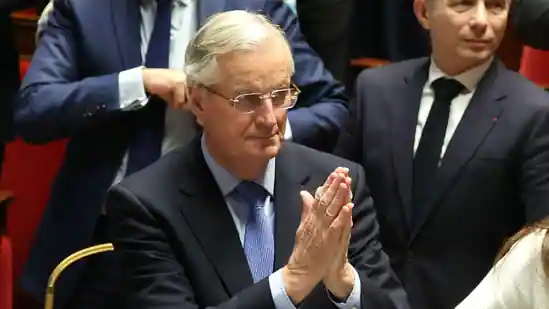French Prime Minister Michel Barnier has become the shortest-serving premier since the establishment of the Fifth Republic in 1958, following a dramatic no-confidence vote in the National Assembly on December 4, 2024.
Barnier, who had been in office for only three months, was ousted over his controversial budget proposal, triggering a deepening political crisis in France.
The no-confidence motion, which united the far-right National Rally and the left-wing coalition, was sparked by Barnier’s budget plan, which included €60 billion ($63 billion) in tax hikes and spending cuts.
The budget aimed to reduce France’s budget deficit to 5% of economic growth in 2025, down from an estimated 6.1% this year.
However, the proposal was met with fierce opposition from both ends of the political spectrum, who criticized the measures as harmful to the French people.
Far-right leader Marine Le Pen, whose party played a pivotal role in the vote, described the budget as “toxic” and called for a “budget acceptable to all.”
Le Pen, who had previously advocated for a national unity approach to the economy, expressed willingness to collaborate with a new government provided they consulted her party in the budget formulation.
“To those who think I’m intent on choosing a policy of disaster, I want to tell them that the disastrous policy would be not to censure such a budget,” she told lawmakers, according to Bloomberg.
Barnier, known for his methodical and pragmatic approach to politics, remained composed throughout the turbulent period leading up to the vote.
In his last speech as Prime Minister, he maintained that he was “not afraid” and remarked that he had “rarely been afraid in my political life.”
The 73-year-old former European Union Commissioner, who gained prominence for his role in negotiating Brexit, had a reputation for his disciplined work ethic, but his leadership style, described as more focused than charismatic, did not resonate with all factions of the French political landscape.
Barnier’s ousting marks a significant moment in French politics. He is the first French Prime Minister in over six decades to lose a no-confidence vote.
The last such instance occurred in 1962, when Georges Pompidou was voted out but later reappointed with the support of then-President Charles de Gaulle.
The roots of Barnier’s political downfall trace back to June 2024 when President Emmanuel Macron, struggling from a crushing defeat in the European elections, dissolved parliament and called for a snap election.
In the wake of that election, the far-right National Rally emerged as the largest party in parliament, with Marine Le Pen positioning herself as a powerful figure.
Macron’s centrist coalition, which had previously dominated, was severely weakened, resulting in a divided lower house composed of three competing blocs: Macron’s centrists, the left-wing alliance, and the far-right.
This fractured political landscape made it increasingly difficult for Barnier to garner support for his economic agenda, setting the stage for his swift downfall.
The political deadlock is unlikely to change until a new parliamentary election can be held in July 2025, keeping France in a state of political uncertainty.
Barnier’s departure marks a major shift in France’s leadership, with many now wondering what the future holds for the nation as it grapples with ongoing political instability and a fractured government.



